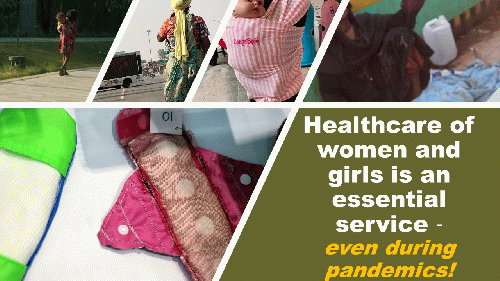
Sexual and reproductive health services are ALWAYS essential, and become even more essential during crisis situations
(Image by CNS) Details DMCA
The bottom line of today's world, which applies to every person on this planet - irrespective of their social, economical or geographical positions - can be simply jotted down in a few words: "COVID-19 pandemic has significantly changed our lives", as said by Dr Jameel Zamir, Director of Programmes at International Planned Parenthood Federation (IPPF), East and Southeast Asia and Oceania region.
Dr Zamir was among the panelists for World Health Day Webinar which also launched the Sustainable Development e-Talks (#SDGtalks), co-hosted by Indian Institute of Management (IIM) Indore and CNS.
Menstruation does not stop during pandemics
During emergency or other crisis situations, safe pregnancy care, safe abortion or menstrual hygiene becomes even more vital, so we have to ensure that women's health and wellness does not slip down the priority in responding to the crisis. Products related to menstrual hygiene, such as sanitary napkins, tampons, etc, are very important for ensuring women's menstrual hygiene. Hence, they ought to be considered as essential commodities. In many societies, openly talking about menstrual hygiene is still considered a taboo and many a young girls and women in countries like India still use unhygienic products (rags, paper, etc) during menstruation. Many organisations like Sustainable Health Enterprise (SHE), Goonj, Code Red, among others, are working towards providing women with proper affordable and accessible sanitary napkins. During the lockdown to contain COVID-19 pandemic in India, several local groups had to step up their efforts to address the need for sanitary napkins and contraceptives. One such group is Asha Parivar led by Ramon Magsaysay Awardee Dr Sandeep Pandey.
While the world eagerly and desperately waits for scientific breakthroughs to prevent and cure COVID-19, we also need to review the reasons for not being able to fully translate earlier scientific breakthroughs into public-health gains without delay. For example, even routine immunization is not reaching every child in the country. That is why it becomes even more critical to address these barriers that prevent communities across the nation to access quality healthcare in a rights-based manner.
When it comes to sexual and reproductive health, there are gender-specific barriers that aggravate the disparities in access to options to prevent unintended pregnancies, sexually transmitted infections and HIV. In National Family Health Survey (NFHS-IV), the unmet need for family planning was 12.9% and contraceptive prevalence rate was 47.8%. Teenage marriages were 26.8% and teenage pregnancies were 7.9%. Despite male sterilization being a non-surgical reversible procedure, only 48,000 male sterilizations were done during 2018-2019 as compared to over 33 lakhs female sterilizations. Abysmally low utilization of male condoms and very poor programmatic uptake of female condoms is yet another reminder of deep-rooted gender-disparities and stereotypes.
In these unprecedented times of COVID-19 pandemic, it becomes far more important to outline what actually are essential services for us as human beings. As said by Dr Zamir to Citizen News Service (CNS), some services that are essential in our day-to-day lives are being neglected because of excess demand and shortage of supply - such as availability of contraceptives and other essential reproductive health services have taken a backseat. Indeed it is important and rather quintessential to put the sexual and reproductive health services under the essential services list, though these are swept away under the carpet many times as a non-essential service.
The lockdown has proven to provide some sort of relief to stopping humongous spread of COVID-19 but it is a double-edged sword, especially when one sees that healthcare for non-COVID-19-related illnesses or conditions is severely impacted. Children and women's health is also an essential part of health security.
(Note: You can view every article as one long page if you sign up as an Advocate Member, or higher).





